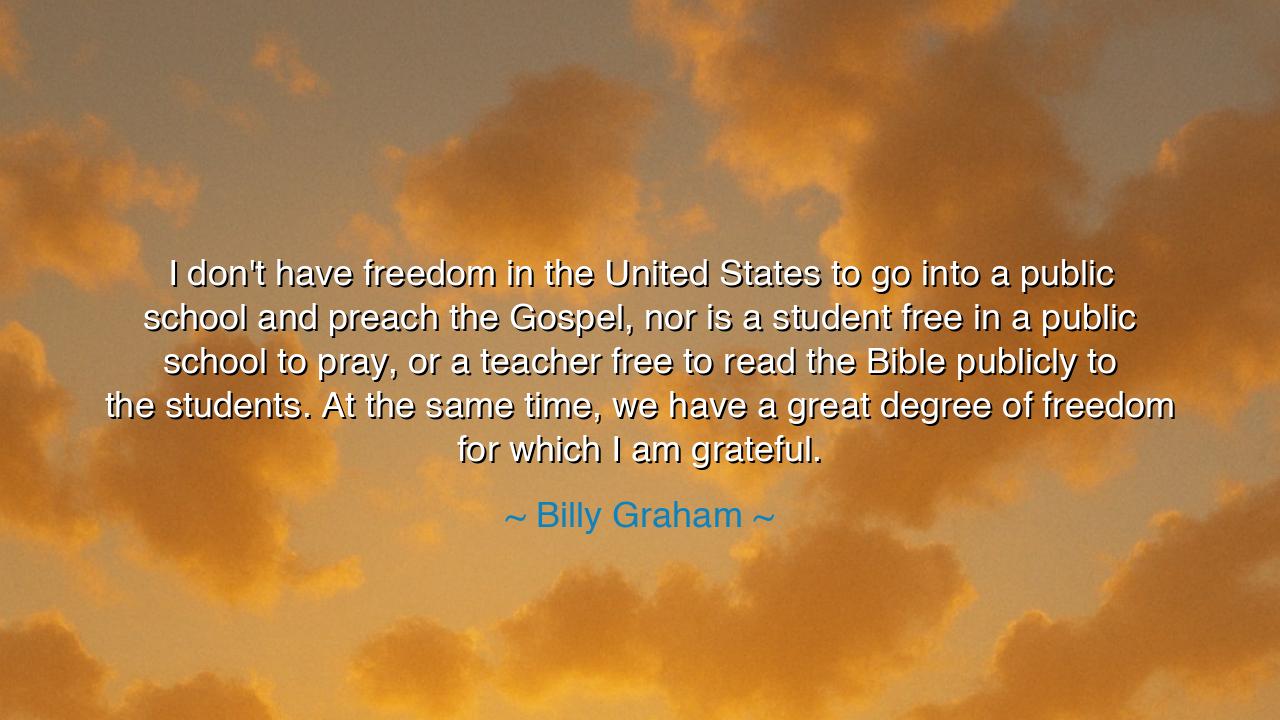
I don't have freedom in the United States to go into a public
I don't have freedom in the United States to go into a public school and preach the Gospel, nor is a student free in a public school to pray, or a teacher free to read the Bible publicly to the students. At the same time, we have a great degree of freedom for which I am grateful.






The words of Billy Graham—“I don't have freedom in the United States to go into a public school and preach the Gospel, nor is a student free in a public school to pray, or a teacher free to read the Bible publicly to the students. At the same time, we have a great degree of freedom for which I am grateful”—resound with the balance of lament and gratitude. They speak of the tension between faith and law, between the yearning of the spirit and the boundaries of a nation that guards liberty through restraint. Graham, with the heart of a preacher and the wisdom of an elder, reminds us that while some freedoms are withheld in public spaces, the greater gift of religious freedom still stands as a pillar upon which a people may live in peace.
The origin of this reflection lies in the American experiment itself. From its founding, the United States sought to honor both freedom of religion and freedom from state-imposed religion. The Constitution’s First Amendment drew a line: the government may not establish religion, nor forbid its free exercise. Yet, as Graham acknowledges, this line carries consequences. Prayer, scripture, and preaching are not barred from private life, but from public schools where the state’s hand must remain neutral. Thus, Graham mourns the absence of open Gospel in schools, yet rejoices that unlike in many nations, believers are still free to worship, to gather, and to proclaim their faith beyond those walls.
History gives us striking examples of those who lived without such balance. In the days of Imperial Rome, Christians were forbidden not only from preaching in schools but from gathering at all. To proclaim Christ openly was to risk torture or death. The martyrs of Rome died in the arenas, torn by beasts or burned by fire, because they had no degree of freedom to practice their faith. In contrast, Graham’s words carry gratitude, for though certain restrictions exist, no American Christian faces the lions for their belief. What he laments is real, but what he cherishes is greater still.
The emotional heart of this quote lies in its tension. On the one hand, there is longing: the preacher’s desire to bring the Gospel to every heart, to see prayer flourish even in schools. On the other hand, there is humility and perspective: an acknowledgment that the freedoms America does provide are profound compared to the oppression elsewhere. In this balance we find a noble lesson: to mourn what is absent without forgetting to give thanks for what is present. For gratitude is the guard of the soul, preventing it from sinking into bitterness.
Graham’s words also remind us that true faith is not bound by law or location. Prayer may be silenced in public ceremony, yet the silent prayer of a child cannot be restrained. Scripture may not be read aloud in class, but its words may yet live in the hearts of teachers and students alike. Faith, when genuine, requires no stage, no sanction—it flourishes in secret as well as in light. What is forbidden in form may still be alive in spirit, and no government can legislate away the quiet flame of belief.
The lesson is thus twofold. First, that freedom must be cherished, even when imperfect. To forget gratitude is to dishonor the sacrifices of those who secured liberty in ages past. Second, that faith must not depend on circumstance but on conviction. The absence of prayer in schools does not destroy prayer itself. The absence of scripture in classrooms does not erase scripture from hearts. What matters most is the living witness of believers, who carry their faith wherever they go, whether into a church, a workplace, or a classroom.
What, then, shall we do? Let us give thanks for the freedoms we enjoy, while also laboring to defend them with vigilance. Let us teach our children that their faith does not depend on permission from institutions but springs from the courage of their own souls. Let us be wise in understanding the laws that shape our society, but also bold in living authentically, never ashamed to let our lives shine with the values we cherish. In this way, the balance that Billy Graham spoke of—lament and gratitude, restraint and liberty—can be lived out with dignity and faith.
Thus, Graham’s words endure as a teaching for all generations: freedom is never absolute, yet gratitude must always be. A faithful heart finds ways to thrive even when outward forms are limited. A grateful heart treasures the liberty it possesses, rather than being consumed by what it lacks. In this balance lies the true strength of both the believer and the citizen: to live thankful, to live faithful, and to live free.






AAdministratorAdministrator
Welcome, honored guests. Please leave a comment, we will respond soon